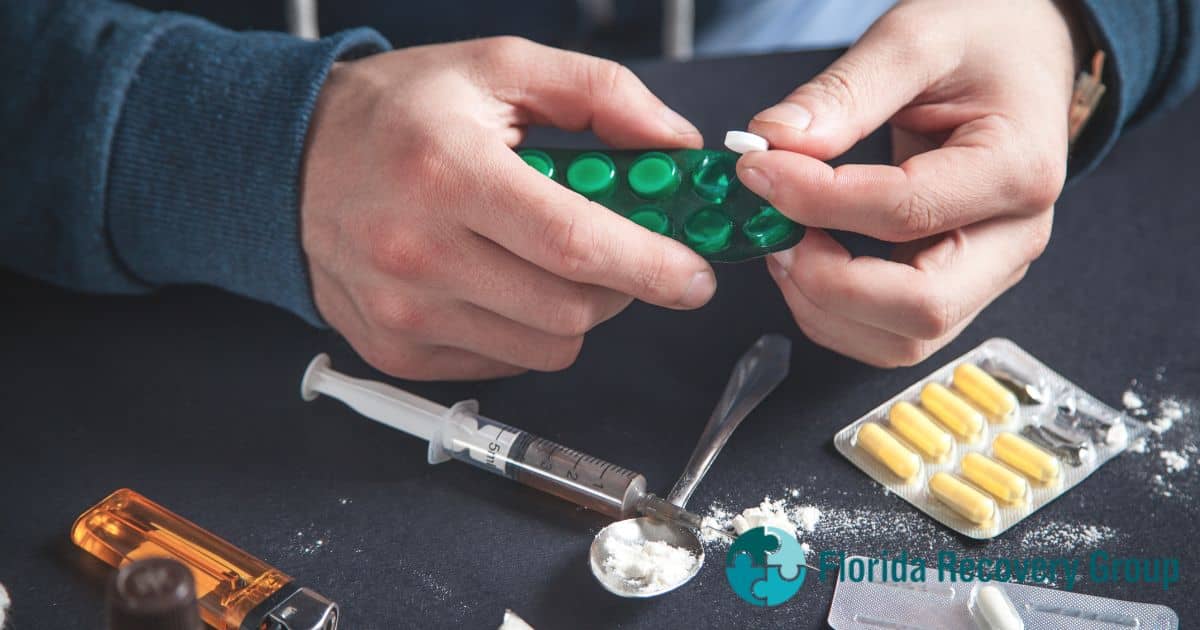
18 Nov Can Drug Abuse Trigger Mental Illness?
When you think of the consequences of substance abuse, you probably imagine poverty, homelessness, crime, and health issues. While addiction can cause all those things, long-term drug abuse can also trigger mental illnesses. If you have a genetic predisposition to certain mental health conditions, abusing drugs and alcohol could cause symptoms to arise.
According to the Substance Abuse and Mental Health Administration, “approximately 9.2 million adults in the United States have a co-occurring disorder.”[1] This means that a significant number of people struggle with both a substance use disorder and a mental illness. While most of these individuals had a mental health condition before they developed an addiction, sometimes the drug abuse causes an underlying psychiatric disorder to begin affecting them.
Understanding how drug abuse can trigger severe mental illness can motivate you to receive life-changing treatment before you begin experiencing a psychiatric issue.
Mental Health Conditions Triggered By Drug Abuse
According to the National Institute of Drug Abuse, “drug use that precedes the first symptoms of a mental illness may produce changes in brain structure and function that kindle an underlying predisposition to develop that mental illness.”[2]
If you have a family history of a specific mental health condition, abusing certain substances could cause changes in areas of your brain related to the development of that mental disorder. Being aware of which substances are linked to mental health conditions can help you take the precautions necessary to stay healthy.
Mental health conditions that are known to be triggered by drug abuse include:
Depression
If you have a genetic predisposition to major depressive disorder, drug abuse can trigger the mental illness because drugs interact with and alter certain areas of your brain that control mood and feelings of well-being.
Some of the substances linked to the development of depression include:
- Benzodiazepines like Xanax or Klonopin
- Psychostimulants such as cocaine, Adderall, or other amphetamines
- Alcohol
- Hallucinogens
- Illicit and prescription opioids
Abusing these substances or experiencing withdrawal from them could trigger a depressive disorder due to changes in the brain. According to the National Library of Medicine, “drug-induced mood symptoms precipitate changes in cerebral structures, such as the frontal cortex, nucleus accumbens, olfactory tubercle, hippocampus, amygdala, and hypothalamus.”[3]
Anxiety
Anxiety disorders can also be triggered by substance abuse. In fact, there is an official mental health condition known as a substance-induced anxiety disorder. This condition causes symptoms similar to generalized anxiety disorder, like constant worrying, trouble concentrating, difficulties with sleep, and panic attacks.
The substances known to trigger anxiety disorders include:
- Alcohol
- Psychostimulants
- Opioids
- Sedatives like benzodiazepines
- Caffeine
In a study of 500 people suffering from opioid dependency, 21% were found to have substance-induced anxiety, while only 2.2% had a pre-existing generalized anxiety disorder.[4]
Bipolar Disorder
Bipolar disorder is a mood disorder that involves periods of intense depression (depressive episodes) and periods of extremely elevated and excitable moods (manic episodes). Bipolar disorder is commonly linked to substance abuse, as impulsive and risky behavior is a symptom of the disorder. While bipolar disorder often leads to substance abuse, abusing certain drugs can trigger the condition in people with a genetic predisposition.
Substances known to trigger bipolar disorder include:
- Cannabis
- Alcohol
- Psychostimulants
- Hallucinogens
- Benzodiazepines
Studies show that the lifetime prevalence of substance use disorders in bipolar I patients is 61%.[3]
Psychosis
Psychosis is a mental disorder that is characterized by a disconnection from reality. If you have this condition, you may experience symptoms of delusions, hallucinations, incoherent talking, and agitation. Psychosis can be a symptom of other mental illnesses like schizophrenia.
Drugs that can trigger substance-induced psychosis include:
- Cannabis
- Cocaine
- Stimulants like methamphetamine
- Hallucinogens
- Phencyclidine (PCP)
- Ketamine
While psychotic disorders can lead to substance abuse, people with a predisposition to psychosis may experience their first episode after abusing one of the above-mentioned substances.
The abuse of stimulant drugs like methamphetamine is highly linked to substance-induced psychosis. Research indicates that psychotic symptoms associated with methamphetamines have a lifetime prevalence of up to 37%.[5]
Schizophrenia
If you have a genetic predisposition to schizophrenia, abusing drugs could cause your disorder to begin affecting you. Schizophrenia may cause symptoms of psychosis, social isolation, and disorganized behavior. Substances that affect the areas of the brain linked to schizophrenia, like the prefrontal and medial temporal lobe regions, could trigger your disorder.[6]
Drugs that can trigger schizophrenia include:
- Cannabis
- Cocaine
- Stimulants like meth and other amphetamines
- Hallucinogens
- Alcohol
It is important to note that substance abuse does not cause schizophrenia, it only triggers it among individuals with a predisposition. If you have no genetic predispositions to the disorder, long-term drug abuse will not cause you to develop it. However, you could experience substance-induced psychosis which involves some of the same symptoms as schizophrenia.
Start Dual Diagnosis Addiction Treatment Today
If you or a loved one suffer from drug addiction and begin experiencing the symptoms of a mental illness, help is available. Having a co-occurring disorder can be extremely difficult, often complicating the treatment of addiction. However, dual-diagnosis rehab centers are equipped to provide you with the tools and support you need to heal from addiction and a comorbid mental illness.
Contact Florida Recovery Group today for more information on our dual-diagnosis addiction treatment program.
References:
- https://www.samhsa.gov/medication-assisted-treatment/medications-counseling-related-conditions/co-occurring-disorders
- https://nida.nih.gov/publications/research-reports/common-comorbidities-substance-use-disorders/why-there-comorbidity-between-substance-use-disorders-mental-illnesses
- https://www.ncbi.nlm.nih.gov/books/NBK555887/
- https://journals.lww.com/addictiondisorders/Abstract/2005/12000/Substance_Induced_Anxiety_Disorder_In_Opioid.6.aspx
- https://www.ncbi.nlm.nih.gov/pmc/articles/PMC8732862/
- https://www.ncbi.nlm.nih.gov/pmc/articles/PMC4235761/





